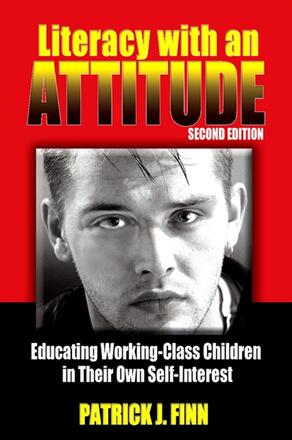
Literacy with an Attitude, Second Edition
Educating Working-Class Children in Their Own Self-Interest
Alternative formats available from:
A comprehensive update of the classic study that delivers both a passionate plea and strategies for teachers, parents, and community organizers to give working-class children the same type of empowering education and powerful literacy skills that the children of upper- and middle-class people receive.
Description
Winner of the 2010 Critics Choice Award presented by the American Educational Studies Association
The classic, indispensable guide for teachers, parents, and community organizers concerned with educating working-class children, Literacy with an Attitude dares to define literacy as a powerful right of citizenship. Patrick J. Finn persuasively debunks the time-honored paradigm for teaching poor and working-class students. Our job, he argues, is not to help such students to become middle class and live middle-class lives—most don't want it. Education rather should focus on a powerful literacy—a literacy with an attitude—that enables working-class and poor students to better understand, demand, and protect their civil, political, and social rights.
This tenth-anniversary, second edition features eight new chapters and a revised and updated original text.
Patrick J. Finn is Associate Professor Emeritus of Education at the University at Buffalo, State University of New York. Finn was named the Robert F. and Augusta Finkelstein Memorial Lecturer for Fall 2008 at Adelphi University. He is the coeditor (with Mary E. Finn) of Teacher Education with an Attitude: Preparing Teachers to Educate Working-Class Students in Their Collective Self-Interest, also published by SUNY Press.
Reviews
"…provides a review of the best sociology that describes all of the aspects of the stratification of schools … The book is an indispensible source of ideas. " — International Socialist Review
"…this second edition provides a thoughtful analysis of how to change what many recognize as a two-tiered school system that underserves the economically disadvantaged. " — CHOICE
Praise for the First Edition
"Finn's writing is so personal, passionate, urgent, and he was speaking, not writing, it seemed, directly to me … I strongly recommend this book to anyone who is concerned about the failure of schools to educate all our citizens into a powerful democratic discourse. " — John M. Watkins, Anthropology and Education Quarterly
"Finn's approach is creative and effective … [The book] is … very important and deserves to be read by teachers … by parents, and by concerned citizens. " — LACMF, Literacy across the CurriculuMedia Focus
"This book makes the reader think. It presents a clear account of the history of literacy which on the surface is familiar; however, the author's ability to define, compare, and contrast empowering education/powerful literacy reframes issues and challenges all complacency. His argument for teaching literacy with an attitude is compelling. It demands evaluation of the status quo and commitment to rethinking schools, literacy definitions, and instructional procedures for children as well as training for preservice and inservice teachers. It suggests productive areas of research that could contribute further understanding of the issues. And, it makes a reader think: What if?" — Mary Anne Doyle, University of Connecticut